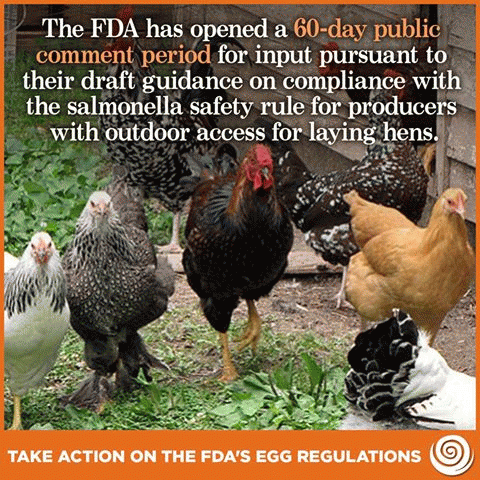by The Cornucopia Institute
CORNUCOPIA,
WI : After years of
deliberation in Congress, inter-agency meetings, lobbyist activity, and a
never-ending stream of food poisoning outbreaks, the Food and Drug
Administration (FDA) is finally poised to implement the Food Safety
Modernization Act (FSMA).
However, according to a just released white paper by The Cornucopia Institute, the FDA's draft rules are so off the mark that they might economically crush the country's safest farmers while ignoring the root threats to human health: manure contaminated with deadly infectious pathogens generated on "factory" livestock farms and high-risk produce-processing practices.
"In response to deadly outbreaks involving spinach, peanut butter and eggs, Congress acted decisively three years ago to pass the Food Safety Modernization Act," said Mark A. Kastel, Co-director at The Cornucopia Institute, a farm policy research group based in Wisconsin. "Better oversight is needed but it looks like regulators and corporate agribusiness lobbyists are simultaneously using the FSMA to crush competition from the organic and local farming movement."
Cornucopia's report closely examines the FDA's draft regulations for implementing the new food safety law, and a new FDA guidance designed to control Salmonella in eggs produced by outdoor flocks. The report concludes that the new proposals would ensnare some of the country's safest family farmers in costly and burdensome regulations in a misdirected attempt to rein in abuses that are mostly emanating from industrial-scale farms and giant agribusiness food-processing facilities.
Family farm advocates, and groups representing consumers interested in high-quality food, thought they had won a victory when the Tester/Hagan amendment was adopted by Congress exempting farmers doing less than $500,000 in business from the new rules. But Cornucopia's report suggests the FDA seems more interested in a "one-size-fits-all" approach to food safety regulation.
In reality, the report suggests that small farms are not really exempt. The FDA is proposing that the agency can, without any due process, almost immediately force small farms to comply with the same expensive testing and record-keeping requirements as factory farms.
" In practical terms," explains Judith McGeary, a member of The Cornucopia Institute's policy advisory panel and Executive Director of the Farm and Ranch Freedom Alliance, " the FDA will be able to target small farms one-by-one and put them out of business, with little to no recourse for the farmers."
The FDA's economic analysis also shows that farms over $500,000 (still small in the produce industry) will be significantly impacted with some being driven out of business.
"The added expense and record-keeping time will potentially force many small and medium-sized local farms -- owner-operated, selling at farmers markets directly to consumers or to local grocers and natural food co-ops -- out of business," Kastel added.
The Cornucopia Institute is encouraging concerned farmers and consumers to visit its website and download a proxy letter to be sent to the FDA encouraging the agency to reconsider some of the key deficiencies in the proposed regulations.
The Institute's analysis points out that the FDA has wildly inflated the number of food borne illnesses that originate from farm production (seed to harvest rather than contamination that occurs later in processing and distribution).
It also alleges that the FDA has failed to recognize that
specific processed crops such as fresh-cut ,
or produce grown in certain regions are the genesis of 90% of dangerous
outbreaks in fruits and vegetables. In
addition to imports from countries like Mexico, where the most recent Taylor
Farms Cyclospora outbreak originated, the evidence indicates that fresh-cut bagged/boxed salad mix and greens, other
pre-cut vegetables and sprouts are much more prone to contamination.
"The proposed rule is a mess,"
said Daniel Cohen, owner of Maccabee Seed Company, a longtime industry
observer. "The FDA has much greater expertise on food safety issues from
harvest to the consumer, but focused instead on farming issues from planting to
harvest. Limited, modest, and more focused steps to improve on-farm food-safety
could have produced simple, affordable, effective, and enforceable regulation."
According to Cornucopia, the most important lost opportunity in the collaborative process between Congress, the FDA and the USDA is the lack of attention directed at the giant concentrated animal feeding operations, or CAFOs (factory farms) raising livestock. The massive amount of manure stored at these factory farms is commonly tainted by highly infectious bacteria that have been polluting America's air, water and farmlands.
(Note: You can view every article as one long page if you sign up as an Advocate Member, or higher).





